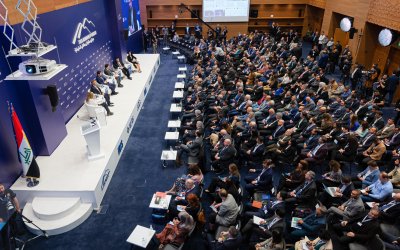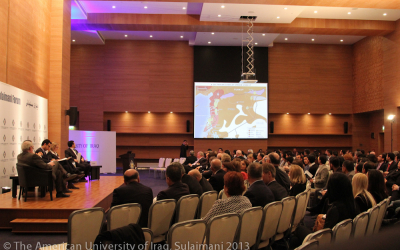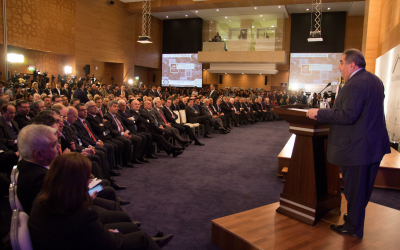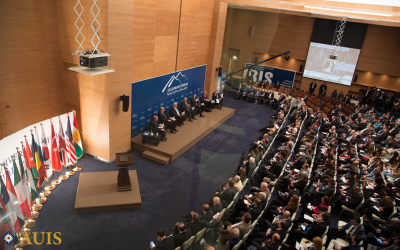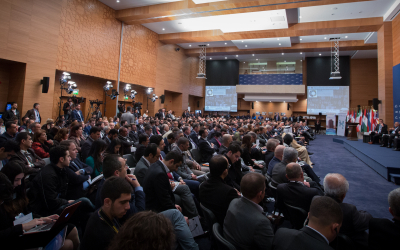The fourth annual Sulaimani Forum, titled “Upheaval and Transformation in the Middle East: Confronting ISIS and Beyond,” convened on the 28th anniversary of the Halabja massacre in 1988 and on the centennial of the Sykes-Picot agreement of 1916. The past century has been one of transformation and tumult, as citizens of the region have struggled to establish economic, political and judicial systems in their respective countries. In recent years, these struggles have come to a head both peacefully and violently with the Arab Spring and the onslaught of ISIS, forcing states to consider, more seriously than ever, how to chart a path forward. Prominent scholars, government officials, political leaders, and journalists from around the world came together at the American University of Iraq, Sulaimani to discuss the war against ISIS, regional dynamics, the economic crisis and challenges for reform, extremism in the region, and the possibilities of breakups and alliances emerging from the turmoil and disorder. The Forum's full proceedings are available here.
Participants included high-level officials from the central government of Iraq and the Kurdistan Regional Government (KRG). Prime Minister of the KRG HE Nechirvan Barzani gave the inaugural address, while the Foreign Affairs Minister of Iraq Ibrahim Al-Jaafari delivered the keynote speech. The National Security Advisor to the Iraqi Government Faleh Fayadh, Special Presidential Envoy for the Global Coalition to Counter ISIL Brett McGurk, Peshmerga Commander Jaafar Mustafa, and the Governor of Ninewa Noefel Humadi Sultan spoke on the first panel, focusing on different forces involved in the military operations against ISIS. The Speaker of the Kurdistan National Assembly Yousif Mohammed Sadiq, the Iraqi Minister of Higher Education Hussein Al-Shahrestani, leader of the Mutahidoun Alliance Osama Al-Nujaifi, and Special Representative to the Secretary General for Iraq at UNAMI Jan Kubis participated on the second panel and examined the political, economic, and security challenges facing Iraq. Saleh Muslim, the co-chair of the Democratic Union Party (PYD), Hemin Hawrami, Head of Kurdistan Democratic Party foreign relations office, Salman Al- Jumaili, the Iraqi Minister of Planning, along with Hasan Turan, an Iraqi MP, and Ambassador Ryan Crocker, former US Ambassador to Iraq looked at the “Clear, Hold, Build” as principle components of defeating ISIS in Iraq and Syria on the third panel. The Former Secretary General of the Arab League Amre Moussa, the KRG President’s Chief of Staff Fuad Hussein spoke about regional dynamics on the fourth panel. Qubad Talabani, the KRG Deputy Prime Minister, Adil Abdul Mahdi, the Iraqi Minister of Oil, Ali Alaq, the Governor of Iraq’s Central Bank, and US Ambassador to Iraq Stuart Jones participated in the fifth panel on the economic crisis and the challenges of reform. Ranj Talabani, the head of Zanyari (Intelligence Services), presented on a panel discussing the extremist narrative in militarized societies. Leading journalists, analysts and thinkers were also major contributors to the discussion both on the panels and in the audience. Thomas L. Friedman, well known New York Times columnist and author, was in the audience on his second trip back to Sulaimani since delivering the commencement speech at the third AUIS graduation ceremony in May 2014. Jane Arraf of Al Jazeera, Liz Sly of the Washington Post, and Cengiz Çandar were amongst the leading journalists covering current affairs in the Middle East who participated in, and attended the forum. Taher Barake, the presenter of Political Memoirs at Al Arabiya took part in the Forum by moderating a panel on Iraq’s future prospects.
Analysts from various think tanks and study centers were also present, most notably, Mina Al-Oraibi, a Yale World Fellow; Kenneth Pollack, Senior Fellow at Brookings Institution; Sir John Jenkins, Executive Director of IISS Middle East and former British diplomat who served as Ambassador to several countries, including Syria and Saudi Arabia; Ambassador Wendy Chamberlin, President of the Middle East Institute in Washington; Laith Kubba, Senior Director for Middle East & North Africa, National Endowment for Democracy; Joseph Bahout, visiting Fellow at Carnegie Endowment for International Peace; and Amberin Zaman, Fellow at the Wilson Center. They took part in discussions on efforts to rebuild and ways to combat sectarian divisions in the midst of proxy wars. World Bank’s Iraq Director Sibel Kulaksiz, the Google think tank Jigsaw Director Yasmin Green, Hudson Fellow Institute Nibras Kazimi, and Senior Fellow at Woodrow Wilson Center Robin Wright contributed to the panel discussions on extremism and turmoil in the region.

Important Links
Access the agenda of the fifth annual Sulaimani Forum here.
Access video of the fifth annual Sulaimani forum here.
Access photos of the fifth annual Sulaimani forum here.
Please click here for information on past Forum.

